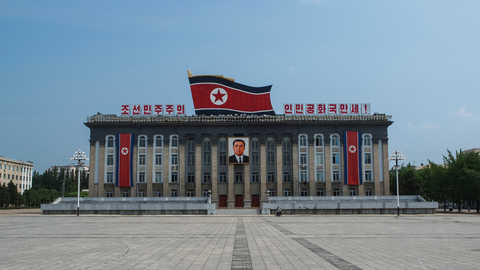
Gwynne Dyer/New Zealand Herald
22 May 2015
22 May 2015
This month North Korea claimed to have launched a ballistic missile from a submerged submarine. Yesterday it announced that it can now make nuclear warheads small enough to fit on a missile. If both claims are true, it can now deliver a nuclear weapon on the United States, at least in theory, but there is always some doubt about North Korean claims.
While a defence official in Pyongyang said on Wednesday that the country's nuclear programme has "long been in the full-fledged stage of miniaturisation," some Western defence experts think the North Koreans have not really mastered the art yet. But General Curtis M. Scaparrotti, the senior US military commander in South Korea, thinks otherwise.
"I believe [the North Koreans] have the capability to have miniaturised the device at this point, and they have the technology to potentially actually deliver what they say they have," Scaparrotti said last October. But to be sure that the miniaturised weapon actually works on a ballistic missile, North Korea would have to test-fire it to see if it survives the heat and vibration of re-entering the atmosphere in working order. It has not yet done that.
Others think that the footage of the submarine launch may have been faked.
However, let us assume both claims are true - because they will be sooner or later.
What does North Korea intend to do with its nuclear weapons? And why is it trying so urgently to persuade its enemies that they are ready to use now?
The rational answer to the first question is that Pyongyang's nukes are solely intended to deter the United States from using nuclear weapons on North Korea. The United States has long-standing military alliances with both South Korea and Japan, and it has never said it would abstain from using nuclear weapons if there were a war between North Korea and its neighbours.
In this rational world, having enough nuclear weapons to deter the United States from going nuclear would give North Korea a major advantage in the event of a ground war in the Korean peninsula. Its army is much bigger than the South Korean and US ground forces facing it.
But rationality has not been the outstanding feature of politics in North Korea recently. In the past three years Supreme Leader Kim Jong-un has purged most of the men who worked closely with his father, Kim Jong-il, and many have been executed. So we cannot just assume that North Korea's nukes are purely defensive, or that Kim Jong-un, after 28 years of living in a gilded cage and three and a half years of absolute power, has been adequately instructed in the theories of nuclear deterrence that have become orthodox in older nuclear-weapons states.
The truth is that the rest of the world doesn't know what is happening in North Korea at the moment. The mystery has deepened with the last-minute cancellation of United Nations Secretary-General Ban Ki-moon's scheduled visit to North Korea. Meantime military forces all over northeastern Asia are undoubtedly on high alert.
While a defence official in Pyongyang said on Wednesday that the country's nuclear programme has "long been in the full-fledged stage of miniaturisation," some Western defence experts think the North Koreans have not really mastered the art yet. But General Curtis M. Scaparrotti, the senior US military commander in South Korea, thinks otherwise.
"I believe [the North Koreans] have the capability to have miniaturised the device at this point, and they have the technology to potentially actually deliver what they say they have," Scaparrotti said last October. But to be sure that the miniaturised weapon actually works on a ballistic missile, North Korea would have to test-fire it to see if it survives the heat and vibration of re-entering the atmosphere in working order. It has not yet done that.
Others think that the footage of the submarine launch may have been faked.
However, let us assume both claims are true - because they will be sooner or later.
What does North Korea intend to do with its nuclear weapons? And why is it trying so urgently to persuade its enemies that they are ready to use now?
The rational answer to the first question is that Pyongyang's nukes are solely intended to deter the United States from using nuclear weapons on North Korea. The United States has long-standing military alliances with both South Korea and Japan, and it has never said it would abstain from using nuclear weapons if there were a war between North Korea and its neighbours.
In this rational world, having enough nuclear weapons to deter the United States from going nuclear would give North Korea a major advantage in the event of a ground war in the Korean peninsula. Its army is much bigger than the South Korean and US ground forces facing it.
But rationality has not been the outstanding feature of politics in North Korea recently. In the past three years Supreme Leader Kim Jong-un has purged most of the men who worked closely with his father, Kim Jong-il, and many have been executed. So we cannot just assume that North Korea's nukes are purely defensive, or that Kim Jong-un, after 28 years of living in a gilded cage and three and a half years of absolute power, has been adequately instructed in the theories of nuclear deterrence that have become orthodox in older nuclear-weapons states.
The truth is that the rest of the world doesn't know what is happening in North Korea at the moment. The mystery has deepened with the last-minute cancellation of United Nations Secretary-General Ban Ki-moon's scheduled visit to North Korea. Meantime military forces all over northeastern Asia are undoubtedly on high alert.


No comments:
Post a Comment